
51 minute read
A LEVELS
A-level represents a well-established and widely understood route to university or employment. A-levels are graded from A* to U.
The most competitive universities often make offers based on A*, such as A*AA. With A* being awarded to those who are academically exceptional, for those who aspire to a top university the implication is clear: work hard! Don’t choose to take A-levels, in preference to the IB Diploma, based on the erroneous perception that A-levels are somehow easier, or that less work is involved.
The IB represents a coherent, broad program of study, which explicitly develops a Learner Profile. In contrast, Alevel makes no such claim. Rather, each individual subject stands alone, with no overarching curriculum or educational principles connecting them. Hence, within A-level it is entirely possible to create a combination of courses that are very narrow in the skills developed. For some destinations a narrow range of skills does not represent a significant issue. This is particularly so for university courses where specific subjects are specified, for example medicine, which often requires Chemistry (and often Biology as well: see “A Guide to Subject Requirements for Degree Courses” on page 10). For an aspirant medic, their curriculum is narrow in that it will be science orientated, and often with a third science or Mathematics. That this curriculum doesn’t develop skills such as essay writing, languages or creativity is not a weakness given the proposed destination. However, there is a risk that a narrow A-level curriculum can limit course choice should the plan to apply for medicine change.
In contrast, it is equally possible within A-level to create a combination of courses that are very broad in the skills developed. So, for the aspirant Lawyer, where grades matter more than subjects, a broad curriculum is appropriate and indeed, arguably, beneficial. Such a curriculum might be History, Mathematics, Physics and French. Another example might be if the post-Oakham destination is Geography at university, then taking Geography at A-level is sensible. The decision is then what other subjects to offer alongside this core subject. Again, by selecting subjects carefully it is possible to assemble a broad curriculum which creates an attractive portfolio of skills to an admission tutor whilst also offering an interesting course of study.
Within the Total Curriculum many useful skills can be developed away from the classroom. In thinking about what subjects to take, also think about how activities can be used to complement classroom learning, and how involvement in the Total Curriculum can be used most effectively to evidence the acquisition of a range of skills. Within IB this widening of learning beyond the classroom is essentially the role of CAS. In contrast, if you take the A-level route the onus is on the individual, in the absence of the structured IB programme, to choose Total Curriculum commitments that offer a similar outcome. Arguably, this makes A-level a more challenging route for holistic learning.
A-level Subject Grid 2021–23 (Provisional February 2021)
You should generally choose FOUR subjects, no more than ONE subject from EACH column below.
A B C D E
Business Biology Biology Biology Art & Design
Chemistry Business Business Chemistry Business
Design & Technology Critical & Contextual Studies Chemistry Economics Computer Science
Economics Economics Classical Civilisation French Economics
Geography Maths & Further Maths+ English Literature Latin English Literature
German History French Maths & Further Maths+ Geography
Classical Greek* Mathematics Geography History Music (Pre-U)
Politics Politics Mathematics Psychology Politics
Spanish Psychology Physical Education
Drama and Theatre Religion and Philosophy
Spanish Philosophy
BTEC Sport and Exercise Science^ BTEC Sport and Exercise Science^ BTEC Business Management~
+If you wish to study A-level Further Mathematics, please select ‘Maths and Further Maths’ in both columns B and D. The course includes A-level Mathematics, so do not select Mathematics elsewhere.
Music and Art are offered as a Pre-U qualification: this is a two-year A-level equivalent course.
^BTEC Sport and Exercise Science must be selected in both columns B and C, as it is the equivalent to two Alevel courses. BTEC Business Management may be chosen as the equivalent to one A-level subject.
A-level subject listings
A-LEVEL ART: CRITICAL AND CONTEXTUAL STUDIES
Student study pages for CCS coursework
Prerequisites You will need to enjoy looking at and discussing art.
Extra-Curricular Opportunities
Possible Career Pathways
Visits to exhibitions and museums in London, Cambridge and Birmingham. Developing exhibitions in the Wheelhouse Gallery.
Students go on to study a wide range of subjects at University, in social science as well as creative courses such as Film, Fine Art, Architecture and History of Art.
ORGANISATION OF WORK: A modern approach to art history that suits both the academic and the practical student. The course helps students to develop research, writing and presentation skills.
EXAMINATION BOARD AND SYLLABUS: OCR
Module Topic Covered
Personal Investigation
Externally Set Task
A portfolio of investigations into a range of art works. Students will learn the formal critical language of art analysis as well understanding function and meaning in art. Similarly a wide range of media is covered from painting, sculpture, architecture and photography to installation and video. The students learn about curation, the art market and art museums. The students submit a ‘Related Study’, which Is a written piece presented alongside and in support of the practical work. .
Students receive an exam paper in February of Form 7, which presents them with a series of starting points. They have around 12 weeks to develop a project which leads to a 15 hour exam. May Form 7 15 hour exam plus preparatory work. Internally assessed and externally moderated 40%
When examined
May Form 7
Assessment Method
Internally assessed and externally moderated
% of grade
60%

Detail from artwork by Pre-U Art Student Daisy Streatfeild
A LEVEL ART AND DESIGN: FINE ART (SPECIALISING IN SCULPTURE OR PAINTING, PRINT AND MIXED MEDIA), TEXTILES DESIGN OR THREE DIMENSIONAL DESIGN
Prerequisites
Extra-Curricular Opportunities
‘B’ grade in GCSE Art
Visit to London exhibitions. Artist-led workshops. Student exhibitions.
Possible Career Pathways
The study of art is essential for careers such as architecture, graphic design, film, animation, photography, media and fashion. It is a good pathway for careers in marketing, publishing, TV, advertising, PR, tourism and game design.
DIFFERENCE BETWEEN GCSE and A LEVEL: The course builds on the working methods of GCSE; though as with all Upper School Art courses there is an increased emphasis on drawing, experimentation and the development of personal ideas.
ORGANISATION OF WORK: This is a two-year course. You will specialise in either Textiles Design, Fine Art: Painting, Print and Mixed Media, Fine Art: Sculpture or Three Dimensional Design. There is considerable freedom to develop individual styles, themes and skills and also exploring the work of other artists and makers.
EXAMINATION BOARD AND SYLLABUS: EDUQAS The students studying painting, print and mixed media are entered for the Fine Art specification. Textiles students take the Textiles Design course and there is the choice between Fine Art: Sculpture or Three Dimensional Design for those wanting to work in 3D.
Module Topic Covered
Personal Investigation
Externally Set Task
Developing skills in a wide range of traditional and new media and techniques intended to build and extend the breadth and depth of learners’ creative practice. The students submit a ‘Related Study’, which Is a written piece presented alongside and in support of the practical work.
Students receive an exam paper in February of Form 7, which presents them with a series of starting points. They have around 12 weeks to develop a project which leads to a 15 hour exam. May Form 7 15 hour exam plus preparatory work. Internally assessed and externally moderated 40%
When examine d
May Form 7
Assessment Method
Internally assessed and externally moderated
% of grade
60%

A-LEVEL BIOLOGY
Prerequisites GCSE Double Award Science (or Biology) Grade 66, or Separate Science Biology and Chemistry Grades 6.
Extra-Curricular Opportunities
Possible Career Pathways
All students will do Biology fieldwork. There will be opportunities for visits to universities and conferences. The Biology Society ('BioSoc') –a range of topical lectures by external speakers, and visits. Further Biology - seminars aimed at stimulating the interest of the more ambitious pupils. Dissection club is an optional activity. EPQ or CREST award. The British Biology Olympiad competition.
A-level Biology lays foundations for further study in university courses ranging from Agriculture to Medicine, and Sports Science to Zoology. Biology is a natural partner to Chemistry, and has areas of overlap with Physics and Geography allowing entry to Biochemistry, Biophysics and Biogeography courses. It is a versatile qualification.
DIFFERENCE BETWEEN GCSE and A-level: Pupils will find that A-level Biology progresses naturally from GCSE. However, there is far more detail, and the approach is much more analytical, and more quantitative, so a questioning approach is vital. If you have coped well with GCSE Science, you should cope with the analytical approach in A-level Biology.
ORGANISATION OF WORK: Students will be expected to do background reading in preparation for lessons, and maintain an orderly folder. Teaching will be split between two teachers to correspond to the different topics.
EXAMINATION BOARD AND SYLLABUS: Edexcel Biology A (Salters-Nuffield)
Module Topic Covered
Paper 1
The natural environment and species survival
Paper 2
Energy, Exercise and Co-ordination
Paper 3 - General and Practical Applications in Biology Topic 1: Lifestyle, Health and Risk Topic 2: Genes and Health Topic 3: Voice of the Genome Topic 4: Biodiversity and Natural Resources Topic 5: On the Wild Side Topic 6: Immunity, Infection and Forensics BN0/01.
Topics 1-4 and Topic 7: Run for your Life Topic 8: Grey Matter. Includes questions from topics 1-8. A prereleased scientific article released 8 weeks before the examination will underpin one section of the paper.
When examined
June Form 7
June Form 7
June Form 7
Assessment Method % of grade
2 hour exam 33%
2 hour exam 33%
2 hour exam 33%



A-LEVEL BUSINESS
Prerequisites B or 6 in GCSE Maths and English or equivalent is desirable.
Extra-Curricular Opportunities
Possible Career Pathways
Trips and excursions across the UK to visit businesses varying from Jaguar, JCB and Emma Bridgewater, plus notable industry speakers.
Multitude of career opportunities across all industries, with an additional insight into jobs in international business.
DIFFERENCE BETWEEN GCSE and A-LEVEL: Business Studies is a new subject at A-level and therefore there is no assumed knowledge when students start the course.
ORGANISATION OF WORK: Students will be expected to do background reading from the business press in preparation for lessons, and to maintain an orderly folder. Research tasks, presentations, written responses and case studies will be set. Teaching will be split between two teachers to correspond to the differing themes of work.
EXAMINATION BOARD AND SYLLABUS: Edexcel
Module Topic Covered
Theme 1 Marketing and people: focus on the role of entrepreneurship; how businesses understand markets in order to develop marketing strategy and the management of people.
Theme 2 Managing business activities: focus on the core functions of finance and production, as well as competitiveness on local and global scales.
Theme 3 Business decisions and strategy: focus on the strategic management of a business and how leaders must examine both internal and external influences in their decision-making.
Theme 4 Global business: focus on how UK businesses trade within a single, global market, exploring the opportunities and constraints that will determine competitiveness.
Pre-released context
Industry-specific context released in November of Form 7: focus on the broader business context of an industry or market that provides opportunity to conduct independent learning and research. June Form 7 Paper 3 2 hour exam (synoptic paper based on context) 30%
When examined
June Form 7
June Form 7
June Form 7
June Form 7
Assessment Method
Paper 1 2 hour exam (Themes 1 and 4)
Paper 2 2 hour exam (Themes 2 and 3)
% of grade
35%
35%
A-LEVEL CHEMISTRY
Prerequisites GCSE Dual Award Science Grade 66 or Chemistry Grade 6 or equivalent. (At least a grade 6 but preferably grade 7 in the Chemistry paper).
Extra-Curricular Opportunities
Opportunities will include practical extension sessions, discussion groups, Olympiad challenge, a trip to a student conference and visiting speakers.
Possible Career Pathways
Chemistry is essential for those considering Medicine, Dentistry or Veterinary Science. Students will acquire a wide variety of skills which are useful in many careers. To find out about your future in chemistry see www.RSC.org.
DIFFERENCE BETWEEN GCSE and A-LEVEL: A-level students should be able to build upon the skills developed within GCSE, particularly in terms of quantitative chemistry, energetics, organic chemistry and bonding. There is an increase in the level of mathematical demand required and smaller groups ensure that students develop really confident practical skills.
ORGANISATION OF WORK: Teaching will be split between two teachers covering different topic areas within the syllabus. Students will be expected to use their textbooks and notes to support the development of their understanding as they work through the course. Some background reading is encouraged through journals such as Chemistry Review.
EXAMINATION BOARD AND SYLLABUS: OCR Chemistry A
Module Topic Covered
Paper 1:
Periodic table, elements and physical chemistry
Paper 2:
Synthesis and analytical techniques
Paper 3:
Unified chemistry
Practical endorsement
Periodic table and periodicity, group 2 and the halogens, enthalpy changes, entropy and free energy, reaction rates and equilibrium, pH and buffers, redox and electrode potentials, transition elements. June Form 7 Multiple choice and structured questions 2hr 15 min 37%
Organic Chemistry: hydrocarbons, alcohols and haloalkanes, aromatic compounds, carboxylic acids and esters, nitrogen compounds, polymers, organic synthesis and analytical techniques. June Form 7 Multiple choice and structured questions 2hr 15 min 37%
Structured summative questions and extended response questions covering aspects from the whole course. June Form 7 1hr 30 min 26%
Reported separately to exam grade, emphasises development of practical skills over the two year course. Non-exam Teacher assessed in lessons 0%
When examined Assessment Method % of grade
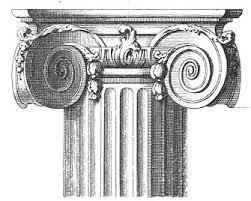
A-LEVEL CLASSICAL CIVILISATION
Prerequisites
None
Extra-Curricular Opportunities
Opportunities will include trips to the British Museum and Classical plays.
Possible Career Pathways
Combines well with English Literature, Theatre Studies, Philosophy, Politics, Latin, Greek, and History. It may lead to a university course in Classical Studies.
DIFFERENCE BETWEEN GCSE and A-LEVEL: The topics are three stand-alone topics, none of which are covered at GCSE except for an introduction to Homer and the ancient world in general. All literature is read in English; there is no element of Latin or Greek language. There is no coursework.
ORGANISATION OF WORK Teaching will be split between two/three teachers to correspond to the differing module content.
EXAMINATION BOARD AND SYLLABUS: OCR
Module
The World of the Hero (H408/11)
Greek Theatre (H408/21)
Politics of the Late Republic (H408/33) Topic Covered
Homer, Odyssey selections (the adventures of Odysseus on his ten-year voyage home from Troy)
Virgil, Aeneid selections (the fall of Troy and the rise of Rome)
Sophocles, Oedipus the King
Euripides, The Bacchae
Aristophanes, The Frogs
(tragedy and comedy in ancient Greece)
The study of the period when the Roman Republican elite ridded themselves of a potential dictator only to lose political freedom to an emperor - a period of big personalities, political intrigue and murder.
When examined June Form 7
June Form 7
June Form 7
Assessment Method
2 hr 20 mins paper 100 marks
% of grade
40%
1 hr 45 mins paper 75 marks 30%
1 hr 45 mins paper 75 marks 30%
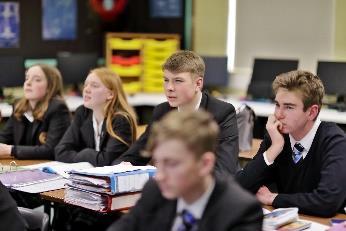
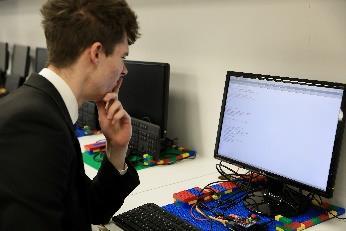

A-LEVEL COMPUTER SCIENCE
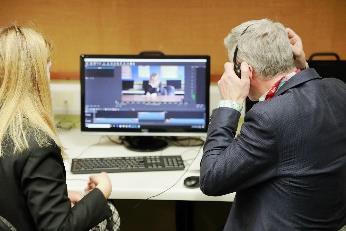
Prerequisites
Extra-Curricular Opportunities
Possible Career Pathways
GCSE Computer Science Grade B or 6. Students who have not studied GCSE Computer Science but have a strong interest are encouraged to first discuss this with Mr Crofts.
Students have the opportunity to go on a variety of field trips, including visits to The National Museum of Computing at Bletchley Park and Warwick University Computer Science in Action. Students may opt to take the British Informatics Olympiad competition in December.
Computer Science has become an essential tool for many Science, Technology, Engineering and Maths (STEM) degrees. For instance, consider the work of the 2013 Nobel Prize winners for Chemistry who “took the chemical experiment into cyberspace” by building complex computer simulation software to understand chemical processes. “Today the computer is just as important a tool for chemists as the test tube” (Michael Levitt, Nobel Prize winner). In addition to STEM pathways it can successfully combine with many other disciplines to provide pathways into new and exciting careers, such as Geography as a pathway into Geoinformatics or Business / Economics as a pathway into Data Science.
DIFFERENCE BETWEEN GCSE and A-LEVEL: A Level Computer Science is a chance to build upon skills developed at GCSE, particularly computer hardware and programming. There is wider scope for students to immerse themselves in developing computer systems of their choice. Smaller groups offer more potential for collaborative development and discussion.
ORGANISATION OF WORK: Students will be expected to complete preparation work for lessons and maintain an orderly folder. Written questions, group research/presentations and project work will be set.
EXAMINATION BOARD AND SYLLABUS: OCR – Syllabus H446
Component Topic Covered
Paper 1 Computer Systems
Paper 2 Algorithms and Programming
Programming Project Information representation, communication and internet technologies, hardware, processor fundamentals, system software, security privacy and data integrity, ethics and ownership, database and data modelling. Algorithm design and problem-solving, data representation, programming, software development. Computational thinking and problem-solving, algorithm design methods, further programming, software development.
When examined
Summer Form 7
Summer Form 7
Summer Form 6 to Spring Form 7
Assessment Method
2 hour 30 minutes exam
% of grade
40%
2 hour 30 minutes exam 40%
Coursework 20%



A-LEVEL DESIGN AND TECHNOLOGY
Prerequisites It is possible to study Design and Technology at advanced level with no previous experience (please contact TCW first). Preferably, students will have taken GCSE Design and Technology.
Extra-Curricular Opportunities
The department is open to students after games on Tuesday/Thursday afternoons and Saturday and Sunday afternoons 2.00-5.30pm. DT visits include factory tours in the UK and an optional trip to Bologna. Guest speakers are also invited to the school to lecture on engineering, product and sustainable building design. Pupils can also participate in the Engineering Education Scheme.
Possible Career Most students go to their first choice university to study a product design, industrial
Pathways design, architecture or engineering degree. Universities include Newcastle, Leeds, Brunel, Northumbria and Loughborough. Some students have combined the subject with Maths and Physics and have gone on to read Engineering at Cambridge. The subject also has close links with art and design related courses. DIFFERENCE BETWEEN GCSE and A-LEVEL: Students should be able to build upon the skills developed throughout GCSE: analysis of products, material properties and manufacturing processes. Pupils learn how to select appropriate materials and processes to design and make products, as well as consider ergonomics, sustainability and safety. They will also have opportunities to explore the impact of technology on society and manufacturing, how social and political issues influenced design movements and the design of everyday products. ORGANISATION OF WORK: Students will be expected to complete some preparation work for lessons, and maintain an orderly folder. Written questions, group research/presentations and project work will be set.
EXAMINATION BOARD AND SYLLABUS: AQA Design and Technology: Product Design (7552)
Module Topic Covered
Paper 1: Written
Exam
Paper 2: Written
Exam
Core technical principles and core designing and making principles June Mixture of short answer, multiple choice and extended response 25%
Commercial manufacture. Product Analysis
Non examined assessment (coursework)
Practical application of technical principles, designing and making principles and specialist knowledge. June Written or digital design portfolio and evidence of final prototype. 50%
When examined Assessment Method % of grade
June Section A: Product Analysis. Short answer questions based on visual stimulus of product(s).
Section B:
Mixture of short and extended response questions 25%



A-LEVEL DRAMA AND THEATRE STUDIES
Director of Drama – Mrs Gilly Norell gn@oakham.rutland.sch.uk
Prerequisites GCSE in Drama is incredibly useful but more important is a keen and driving interest in theatre. However (at least) B or 6 grades in English, Religious Studies or History are a good an indicator that you will be able to cope with the written components.
Extra-Curricular Opportunities
Possible Career Pathways
A wide range of Theatre visits. A one week trip to the National Student Drama Festival and a bi annual trip to the Edinburgh Fringe.
Theatre – acting, directing, producing. TV and film. For those not wishing to pursue a career in the profession, the confidence and skill to effectively use your voice and the development of enhanced presentation skills are vital in each and every pathway.
DIFFERENCE BETWEEN GCSE and A-LEVEL: More in depth study of play texts involving the creative exploration of plays as well as more sophisticated devising work.
ORGANISATION OF WORK: Teaching will be divided between two teachers to reflect the structure of the modules. EXAMINATION BOARD AND SYLLABUS: Eduqas
Module Topic Covered
Component 1 Theatre Workshop
Component 2 Text in Action
Students participate in the creation, development and performance of a piece of theatre based on a re-interpretation of an extract from a play. The piece is developed using the techniques of an influential theatre practitioner. A creative log is part of the assessment. June Form 6 Internally Assessed, externally moderated 20%
Students will participate in the creation, development and performance of two pieces of theatre based on a stimulus. One is devised and one is from a script. A process and evaluation report is part of the assessment. May Form 7
Externally Assessed by Visiting Examiner
40%
Component 3 Sections A & B are questions based on both Pre-1956 and Post 1956 plays. Section C is based on a specific extract from The Curious Incident of the Dog in the Night-Time.
When examined
June Form 7
Assessment Method
2 ½ hour written exam
% of grade
40%

A-LEVEL ECONOMICS
Prerequisites GCSE Maths Grade B or 6 and GCSE English Language Grade B or 6, or equivalent. An interest in current affairs and the world around you.
Extra-Curricular Opportunities
Include a range of speakers, trips to London and abroad.
Possible Career Pathways
Students will acquire a wide variety of skills, useful in many careers.
DIFFERENCE BETWEEN GCSE and A-LEVEL: The subject is not offered in the Middle School at Oakham. Therefore we assume students have no theoretical knowledge. We move from zero to hero over the course!
ORGANISATION OF WORK: Activities, discussions and presentations will be incorporated into lessons.
Students will be expected to do background preparation for lessons, and maintain an orderly folder. Written essays and some calculations will be set. Multiple choice questions and definitions tests will also be used.
EXAMINATION BOARD AND SYLLABUS: AQA
Module Topic Covered
Markets and market failure
National and International economy
Economics principles and issues
Market structure (competition), market failure (environmental), government solutions, the labour market and poverty and inequality. Summer of Form 7 Data response and essay 33%
Inflation, unemployment, growth, development, economic policy, financial markets and the international economy. Summer of Form 7 Data response and essay 33%
All of the above.
When examined
Summer of Form 7
Assessment Method
Multiple choice and case study
% of grade
33%
A-LEVEL ENGLISH LITERATURE
Prerequisites IGCSE or GCSE Language and Literature B or 6 grades.
Extra-Curricular Opportunities
An English Enrichment group will encourage all students to consider reading English at university; attendance is required for Oxbridge candidates. There are periodic theatre trips, visits and lectures.
Possible Career Pathways
Students will acquire a wide variety of skills which are useful in many careers: law, journalism, media, teaching and many others; any career area in which critical thinking and research skills are required.
DIFFERENCE BETWEEN IGCSE and A-LEVEL: a greater number of texts will be studied, including critical texts, building upon the skills learnt at IGCSE and developing skills that will be used in many subjects at university.
ORGANISATION OF WORK: students will be expected to undertake reading and research in preparation for lessons and to play a full role in discussions. Teaching will be split between two teachers.
EXAMINATION BOARD AND SYLLABUS: Edexcel
Module Topic Covered
Component 1:
Drama
One Shakespeare play and one other tragedy/ comedy (pre or post 1900); critical essays from the anthology. June Form 7 2 hours 15 minutes exam. Two essays. Open (clean) texts. 30%
When examined
Component 2:
Prose
Two prose texts from a chosen theme. At least one text must be pre-1900. June Form 7 1 hour. One comparative essay on chosen theme. Open (clean) texts. 20%
Component 3:
Poetry
Component 4:
Coursework
One poetry selection of post-2000 works (anthology); one chosen collection from a period or a poet. June Form 7 2 hours 15 minutes. Two essays: one comparative; one thematic. 30%
Two linked and complete texts in any genre, not studied elsewhere in the specification. June Form 7 One comparative essay 20%
Assessment Method % of grade



A-LEVEL FRENCH
Prerequisites A* or 8 or A or 7 grade at IGCSE (or equivalent). It is usual to score a grade below GCSE performance, if you get an A or 7 grade or below.
Extra-Curricular Opportunities
Work Experience Trip to France in Form 6. Also various day project opportunities, business and international journalism.
Possible Career Pathways
Commonly Law, Accountancy, International Relations, International Business, Marketing, Journalism.
DIFFERENCE BETWEEN GCSE and A-LEVEL: The language, of course, remains the same, but the course is a step up from GCSE. A solid core of grammar has to be developed early with topic-specific vocabulary being a priority. Topics covered are listed below. Form 7 includes literary and film study and an individual project which feeds into the oral examination.
ORGANISATION OF WORK: Two teachers to deliver topics with public examinations at the end of Form 7.
EXAMINATION BOARD AND SYLLABUS: AQA
Module Topic Covered. When examined Assessment Method % of grade
1 Social issues and trends
2 Political and artistic culture
3 Literary texts and films Aspects of French speaking society: The changing state of the family, The digital world, Youth culture Multiculturalism: Immigration, racism and integration
Aspects of French-speaking society: the changing nature of family, the cyber society, the place of voluntary work Current Issues: Positive features of a diverse society, life for the marginalised, how criminals are treated June Form 7
Students will study one film and one text June Form 7
4 Individual research project Student will identify one aspect or key question which is of personal interest to them and related to a country where French is spoken – this is discussed in the oral
exam
June Form 7
Paper 3
20 min oral exam using a stimulus card to discuss topic areas. Presentation and discussion of Individual Research Project 30%
Paper 1
2hr 30 min combined listening, reading and writing exam – student controls listening 50%
Paper 2
2hr written exam on the film and text they have studied 20%


A-LEVEL GEOGRAPHY
Prerequisites
Extra-Curricular Opportunities
GCSE Geography Grade B or 6
Students have the opportunity to go on a variety of field trips. Compulsory trips include a visit to Birmingham and a 3 day residential stay in Yorkshire. The department also runs a biennial field trip to Italy. Other trips in the past have included Iceland, Switzerland and the USA.
Possible Career Pathways
Geography is an intellectually challenging subject and at degree level has one of the highest employment rates of any university course. Students will acquire a wide variety of skills useful in a vast array of careers. These include directly and indirectly related careers such as Environmental Consultancy, Urban Planning, Property Development, The Foreign Office, Law, Business and Finance.
DIFFERENCE BETWEEN GCSE and A-LEVEL: A-level students should be able to build upon the skills developed by GCSE, particularly numeracy, literacy and analytical. Data manipulation, statistical and fieldwork skills will also be further enhanced.
ORGANISATION OF WORK: Students will be expected to do background reading in preparation for lessons, and maintain an orderly folder. Short answer questions, as well as longer essay style tasks will be set. Teaching will be split between two teachers according to module content.
EXAMINATION BOARD AND SYLLABUS: Cambridge International A-level
Module Topic Covered
Paper 1 Physical Geography
In this unit students will study Hydrology, Atmosphere and Weather and Plate Tectonics
Paper 2 Human Geography
In this unit students will study Population, Migration and Settlement dynamics.
Paper 3 Advanced Physical Options
In this unit students will study Coastal Environments and Hazardous Environments
Paper 4 Advanced Human Options
In this unit students will study Globalisation, Tourism and Economic Geography.
When examined
June Form 7
June Form 7
June Form 7
June Form 7
Assessment Method
1.5 hour exam
% of grade
25%
1.5 hour exam 25%
1.5 hour exam
1.5 hour exam 25%
25%


A-LEVEL GERMAN
Prerequisites 9-6 grade at IGCSE is preferred.
Extra-Curricular Opportunities Planned Form 6 trip to Berlin in the Summer Term. Work experience and immersion course opportunities in Austria and Germany.
Possible Career Pathways Commonly Law, Accountancy, International Relations, International Business, Marketing, Journalism. There is no limit.
DIFFERENCE BETWEEN GCSE and A-LEVEL: The course is a step up from GCSE and a solid core of grammar is developed early. Topic-specific vocabulary is a priority. There is also literary and film study in Form 7.
ORGANISATION OF WORK: Two teachers to deliver topics over two years.
EXAMINATION BOARD AND SYLLABUS – AQA
Module Topic Covered. When examined Assessment Method % of grade
1 Social issues and trends
2 Political and artistic culture
3 Literary texts and films Aspects of German-speaking society: The changing state of the family, The digital world, youth culture Multiculturalism: Immigration, racism and integration
Artistic culture: Festivals and traditions, art and architecture, Cultural life in Berlin, past and present Aspects of political life: Germany and the European Union, Politics and youth, German re-unification and its consequences June Form 7
Students will study one film and one text June Form 7
4 Individual research project Students will identify one aspect or key question of personal interest which relates to a country where German is spoken June Form 7
Paper 1
2hr 30 min combined listening, reading and writing exam – student controls listening 50%
Paper 2
2hr written exam on the film and text they have studied
Paper 3
20 min oral exam using a stimulus card to discuss topic areas. Presentation and discussion of Individual Research Project 20%
30%
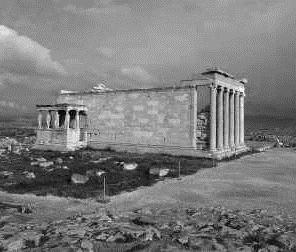
A-LEVEL CLASSICAL GREEK
Prerequisites GCSE Greek Grade 6.
Extra-Curricular Opportunities
Possible Career Pathways
Opportunities will include a trip to the British Library and Classical plays including the Greek play at Cambridge or Oxford.
Law, Foreign Office, GCHQ, Civil Service and the City. As an A-level, it combines well with English, History, Philosophy, Languages and Mathematics.
DIFFERENCE BETWEEN GCSE and A-LEVEL: As Greek is demanding at GCSE, the transition to A-level is relatively smooth. The grammar is already covered and the pace considerably less than Gratin. The literary passages are longer but the technique is essentially similar to GCSE. There is no coursework.
ORGANISATION OF WORK: Teaching will be split between two/three teachers to correspond to the differing module content.
EXAMINATION BOARD AND SYLLABUS: OCR
Module Topic Covered When examined
Component 1 Translation of unseen Greek prose and verse Prose author: Thucydides Verse author: Sophocles June Form 7
Component 2 Prose Composition (English to Greek) June Form 7
Component 3 Prose Literature Study of extracts from Herodotus, Book 7 in Greek. Further study of chosen prose author’s work in English to understand the context of the set text.
Component 4 Verse Literature Study of extracts from Homer, Iliad 9. Further study of chosen verse author’s work in English to understand the context of the set text. June Form 7
June Form 7
Assessment Method
1 hour 45 mins exam
% of grade
33%
1 hour 15 mins exam 17%
2 hour exam 25%
2 hour exam 25%
A-LEVEL HISTORY


Prerequisites
Extra-Curricular Opportunities
Possible Career Pathways
GCSE History Grade B or 6 or GCSE English Language and Literature Grade B or 6 if History was not studied.
Trips on offer will include the opportunity to go on our biennial History Tour to Moscow and St Petersburg.
Journalism, Law, Business, Civil Service and Banking. Students will acquire a wide variety of skills which are useful in many careers.
DIFFERENCE BETWEEN GCSE and A-LEVEL: A-level students will build on skills developed by GCSE, particularly analytical and evidence-based skills. There is wider scope for independent learning, particularly when students move on to the coursework option. Smaller groups offer more potential for discussion and debate. There is opportunity to study a greater variety of History from contrasting periods: ranging from the collapse of autocratic rule in Russia, to the modern political, economic, social and cultural history of the United Kingdom. Students will also have the opportunity to study how slavery was abolished by the British Parliament in the early nineteenth century. The qualification is assessed through two exams at the end of the two-year course and through a single coursework essay.
ORGANISATION OF WORK: Background reading, essays, document work and maintaining an orderly folder are expected. Teaching is split between two teachers according to module content. Pupils will be mentored for their coursework but need to be able organise their time effectively and take responsibility for meeting key deadlines.
EXAMINATION BOARD AND SYLLABUS: AQA A-level 7042
Component Topic Covered
Paper 1:
Tsarist and Communist Russia, 1855-1964
Paper 2:
The Making of Modern Britain, 1951 - 2007
Student Historical Investigation
(NEA): The Campaign for the Abolition of Slavery, 1730 - 1838 The failure of Tsarist reforms and the causes of the Russian Revolution; Communist Russia under Lenin, Stalin and Khrushchev
Post-War Britain: the Affluent Society & the Sixties Revolution; the end of the Post-War Consensus (1970s) and Thatcherism; New Labour and Tony Blair.
Why slavery came to be abolished in the British Empire; was it the humanitarian movement or was it because slavery no longer made economic sense? June Form 7 3500 word essay (assessed internally) 20%
When examined
June Form 7
June Form 7
Assessment Method
Exam 2 hours 30 minutes
% of grade
40%
Exam 2 hours 30 minutes 40%
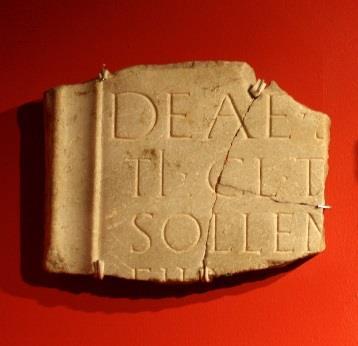
A-LEVEL LATIN
Prerequisites
GCSE Latin Grade 6
Extra-Curricular Opportunities Opportunities will include a trip to the British Library and Classical plays.
Possible Career Pathways Law, Foreign Office, GCHQ, Civil Service and the City. As an A-level, it combines well with English, History, Philosophy, Languages and Mathematics.
DIFFERENCE BETWEEN GCSE and A-LEVEL: As Latin is demanding at GCSE, the transition to A-level is relatively smooth. The grammar is already covered. The literary passages are longer but the technique is essentially similar to GCSE. There is no coursework.
ORGANISATION OF WORK: Teaching will be split between two/three teachers to correspond to the differing module content.
EXAMINATION BOARD AND SYLLABUS: OCR
Module Topic Covered When examined Assessment Method % of grade
Component 1 Translation of unseen Latin prose and verse Prose author: Livy Verse author: Ovid June Form 7 1 hour 45 mins exam 33%
Component 2 Prose Composition (English to Latin)
Component 3 Prose Literature Study of extracts from Tacitus, Histories 1, in Latin. Further study of chosen prose author’s work in English to understand the context of the set text.
Component 4 Verse Literature Study of extracts from Virgil, Aeneid 11, in Latin. Further study of Virgil, Aeneid in English to understand the context of the set text. June Form 7
June Form 7
June Form 7 1 hour 15 mins exam 17%
2 hour exam 25%
2 hour exam 25%

A-LEVEL MATHEMATICS
Prerequisites
GCSE Mathematics at least a grade 7 is required; a grade 8 or 9 is recommended.
Extra-Curricular Opportunities Students may opt to take the UK Senior Maths Challenge in November. Senior Maths Team practices are open to all in the Winter term.
Possible Career Pathways Mathematics is an essential tool for many scientific degrees, and students have gone on to study Science, Engineering, Medicine, Economics and, of course, Mathematics at university. Joint Honours between Maths and other subjects is a possibility.
DIFFERENCE BETWEEN GCSE and A-LEVEL: A-level students will build upon the skills developed by GCSE, particularly algebraic manipulation and the presentation of rigorous mathematical arguments.
ORGANISATION OF WORK: Teaching will be shared between two teachers. Students will be expected to keep an orderly folder and complete weekly preps.
EXAMINATION BOARD AND SYLLABUS: Edexcel
Module
Paper 1: Pure Mathematics 1
Paper 2: Pure Mathematics 2
Paper 3: Statistics and Mechanics Topic Covered
Proof, algebra and functions, coordinate geometry, sequences and series, trigonometry, exponentials and logarithms, differentiation, integration and vectors. June Form 7 2 hour examination 33.3%
Proof, algebra and functions, coordinate geometry, sequences and series, trigonometry, differentiation, integration and numerical methods. June Form 7 2 hour examination 33.3%
Statistical sampling, data representation and interpretation, probability, statistical distributions and hypothesis testing.
When examined Assessment Method
June Form 7 2 hour examination
% of grade
33.3%
Kinematics, forces and Newton’s laws and moments.

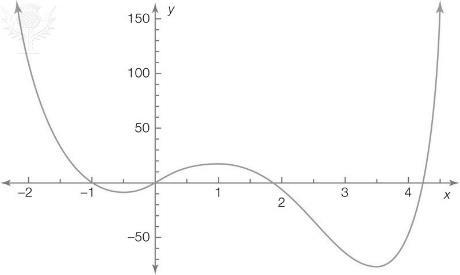
A-LEVEL FURTHER MATHEMATICS
Prerequisites
Mathematics GCSE at a high grade 9 is required.
Extra-Curricular Opportunities Students take the UK Senior Maths Challenge in November. Senior Maths Team practices are open to all in the Winter term.
Possible Career Pathways Many have studied Mathematics, Natural Science, Economics or Engineering at top universities. Many Further Maths students successfully apply for Oxbridge and the most competitive London universities, with others pursuing courses at top universities elsewhere.
DIFFERENCE BETWEEN GCSE and A-LEVEL: This course extends mathematical knowledge at a rapid pace beyond GCSE, with a significant reliance on algebraic fluency and accuracy.
ORGANISATION OF WORK: Teaching will be split between four teachers and students will be expected to keep an orderly folder.
EXAMINATION BOARD AND SYLLABUS: Edexcel
Module Topic Covered
Paper 1:
Further Pure Mathematics 1
Paper 2:
Further Pure Mathematics 2
Paper 3:
Further Statistics 1
Proof, complex numbers, matrices, further algebra and functions, further calculus and further vectors June Form 7 1.5 hour examination 25%
Complex numbers, further algebra and functions, further calculus, polar coordinates, hyperbolic functions and differential equations. June Form 7 1.5 hour examination 25%
Linear regression, statistical distributions, correlation, hypothesis testing and Chi squared tests. June Form 7 1.5 hour examination 25%
When examined Assessment Method % of grade
Paper 4:
Further Mechanics 1
Momentum and impulse, collisions, centres of mass, work and energy and elastic strings and springs. June Form 7 1.5 hour examination 25%



Pre-U MUSIC
Director of Music – Mr Peter Davis pd@oakham.rutland.sch.uk
Prerequisites
Ideally a minimum of Grade 6 at GCSE Music, but strong instrumentalists/singers with sufficient theoretical/harmonic understanding may opt for the course having first consulted Mr Davis.
Extra-Curricular Opportunities Regular curricular concert trips, plus everything offered by Music Department’s vibrant and exciting extra-curricular programme.
Possible Career Pathways Obviously working as a professional musician/teacher. However, the transferable skill-set of a trained musician makes them exceptionally attractive to graduate recruiters in any employment field.
DIFFERENCE BETWEEN GCSE and PRE-U: There is a similar course structure (Listening/Composing/Performing), but with more in-depth analysis of a set work and contextual understanding of set periods. There is a natural progression from GCSE of all course elements, plus the opportunity to specialise in Component 4 to shape the course to your strengths. A Grade 7 standard is ideally required for the compulsory performance elements (Grade 8 for Advanced Recital).
ORGANISATION OF WORK: Strong organisation skills required, including maintaining an orderly folder, balancing preps from three teachers, and a strict programme of coursework deadlines during Form 7 to spread the workload. EXAMINATION BOARD AND SYLLABUS: CAIE
Module Topic Covered
Component 1 Listening, Analysis and Historical Study: The Symphony in the Classical Period Orchestral Music in the 19th Century Choral Music in the Baroque Period General questions.
Component 2 Performing Recital (15-20 minutes) [15%] Extended Performing (8-10 minutes) [7.5%].
Component 3 Composing Portfolio of 10 stylistic exercises [7.5%] One ‘commissioned’ composition [7.5%] Stylistic exercise exam [7.5%].
Component 4 Personal Study - one of the following options: Dissertation (41) 3,500 words on any topic Advanced Recital (42) 30 mins, plus essay Free Composition (43) two contrasting pieces Music Tech (44) arrangement/composition.
When examined
June Form 7
Assessment Method
2 x 90 min exams
% of grade
30%
March Form 7
Form 7: by Easter by Easter June
Form 7: by Feb exeat
Exam in front of external examiner 22.5%
Coursework Coursework 2 hr exam 22.5%
Coursework 25%
A-LEVEL PHILOSOPHY
Prerequisites
GCSE Grade B or 6 in Religious Studies and/or History and a GCSE Grade B or 6 in Mathematics. It is possible to study the A-level without having studied GCSE RS, and students who do so will not be significantly disadvantaged.
Extra-Curricular Opportunities Opportunities include the Philosophy Society, which organises regular lectures and discussions.
Possible Career Pathways Law, Finance, Journalism, Marketing, PR, Politics, Civil Service, business. Students will acquire a variety of useful skills much sought after by a wide range of employers.
DIFFERENCE BETWEEN GCSE and A-LEVEL: The evaluative skills developed in GCSE Religious Studies are built on in the A-level course and there is some continuity in content in the Metaphysics of God module. However, the focus is on logical reasoning and textual analysis so the approach is very different from the GCSE.
Students wishing to study Philosophy of Religion or religious beliefs and practices should consider the A-Level in Religion and Philosophy.
ORGANISATION OF WORK: Students will be expected to complete questions in preparation for class discussion, further note-taking in lessons and to engage fully in class discussions. Teaching will be split between two teachers, with one teacher covering Moral Philosophy and Metaphysics of God and the other, Epistemology and Metaphysics of Mind.
EXAMINATION BOARD AND SYLLABUS: AQA
Module Topic Covered
Moral Philosophy
Epistemology
Metaphysics of Mind
Metaphysics of God
What it means to live ‘the good life’, looking at three classical approaches, how these approaches apply to real life and what it means to say that an action is ‘good’.
The study of what it means to have knowledge and to what extent we can have knowledge of the external world.
An in-depth exploration of whether we can know that humans have a mind, that I have a mind, that other people have minds; and if so, what the nature of this mind is. Exam (shorter questions and evaluative essays) 3 hrs 50%
An analytical study of the logic used to support the nature and existence of the ‘God of the philosophers’ and what, if anything, we are discussing when we refer to ‘God’.
When examined
Summer Form 7
Assessment Method
Exam (shorter questions & evaluative essays) 3 hrs
% of grade
50%


A-LEVEL PHYSICS
Prerequisites The standard GCSE subjects which support A-level Physics are Maths, Physics and Chemistry. Ideally you should have at least Grade ‘B’ or 6 but preferably ‘A’ or 7 in Physics and Maths.
Extra-Curricular Opportunities
Huge amounts including The Physics Society, Further Physics and extra FP sessions in the evenings, the Engineering Scheme, CREST, EPQ, The Physics Challenge and Olympiad and a Physics Books Club.
Possible Career Pathways
Physics is important for Engineering, Design or Architecture, Medicine, Dentistry or Veterinary Science, Physiotherapy or Sports Science, Metallurgy or Materials Science, Geology or Environmental Science, Computer Science or Archaeology. It is a key qualification for those interested in Chemistry, Mathematics, Biology, Pharmacy, Philosophy and Psychology.
DIFFERENCE BETWEEN GCSE and A-LEVEL: GCSE is the start of a journey for Physics. It lays down the foundation that the higher levels build on. It is important to get the GCSE knowledge as strong as possible when you remember that Physics is the study of nature. By this we mean absolutely everything from objects smaller than atoms to objects larger than the universe! In Physics we try to understand nature – try to explain why everything is the way it is. This makes Physics the major pure science. It underpins all other pure and applied sciences as well as most areas of engineering and medicine.
‘How’ and ‘why’ are important questions for the Physicist – knowing that something happens is not good enough. The Physicist tries to understand the basic reasons driving all events. Physics explores such questions as “Why is the sky blue?”; “What makes the sun shine and what will happen when the sun dies?”; “What is matter made of?”; “How do forces push and pull?”; “How did the universe begin and will it ever end?” Physics explains how a pile of sand may be an opaque solid (a ‘brick’), a transparent solid (glass) or the chip at the heart of every computer.
ORGANISATION OF WORK: The classes are team taught by two teachers and like all subjects in A-level or IB, students are expected to pour effort into the subject to ensure they get a grip of all they meet. Topic areas are Mechanics, Electricity, Physical Properties, Fields and Forces, Medical Physics, Thermal, Atomic and Nuclear, Astrophysics, Waves, Energy and Power.
EXAMINATION BOARD AND SYLLABUS: OCR – Syllabus A
Module Topic Covered
Modelling Physics Forces, Motion, Work, Energy, Thermal, Astrophysics.
Exploring Physics Waves, Electricity and Magnetism, Particles, Medical.
Unified Physics All areas
When examined Assessment Method % of grade
June Form 7 Exam 37%
June Form 7 Exam 37%
June Form 7 Exam 26%
A-LEVEL POLITICS


We live in a complex world with significant challenges including global terrorism, poverty, economic instability, weapons proliferation, failing states and environmental. degradation. This course encourages discussion and debate and requires students to study and present different global perspectives as well as interpreting competing and contestable claims. In short, Politics is ultimately about people.
Prerequisites
GCSE Grade B or 6 in History / Geography or Religion is desirable as constructing arguments / evaluating evidence are key skills.
Extra-Curricular Opportunities Highly recommend MUN activity which leads to Dublin, Edinburgh and Amsterdam Conferences. We do visit UK / EU Parliament, Crown /Supreme Court and visit Washington DC every two years.
Possible Career Pathways Law, Journalism, Foreign Office, NGOs, Banking and Management.
WHAT SKILLS DO YOU NEED TO STUDY POLITICS? Politics is a subject that should appeal to pupils who take an active interest in current affairs. Some of the skills that you will need when studying the subject are similar to those you may have developed when studying History or other Humanities subjects earlier in your school career (e.g. essay writing or data response).The special skills of wanting to know more about Politics as well as asking how and why things are happening around the world. Developing an interest in, and engagement with, contemporary politics is essential.
ORGANISATION OF WORK: The course is taught in a variety of learning styles from debates, presentations and supplemented by textbooks. If you’re in the habit of reading a quality newspaper, or listening to the broadcast news, then you’ll have noticed that there is always a Politics story. The willingness to keep up to date with current issues is an important attribute. Our best pupils combine their passion for the subject with solid academic skills of good time management and organisation.
EXAMINATION BOARD AND SYLLABUS: Edexcel (Pearson)
Module Topic Covered
UK Politics Elections, Political Parties, Democracy and Voting Behaviour. June Form 7 2 hour exam 33.3
UK Government
Parliament, Prime Minister, Constitution, Supreme Court and optional Political Ideas
International Politics
Superpower status, UN, Human Rights, Terrorism, Poverty and State Sovereignty.
When examined
June Form 7
June Form 7
Assessment Method % of grade
2 hour exam 33.3
2 hour exam 33.3




A-LEVEL PSYCHOLOGY
Head of Department – to be confirmed lfd@oakham.rutland.sch.uk
Prerequisites
Skills required and developed
Possible Career Pathways
Ideally GCSE English grade 6, GCSE Maths grade 6
With its emphasis on scientific data analysis, interpretation of literature, and essay writing, a good understanding of maths, English and the sciences is fundamental. Psychology develops awareness of ethical issues in research work and brings in moral and cultural aspects of human behaviour. Tolerance of the wide diversity of human behaviour will be encouraged.
A psychology degree can lead to careers in many fields, including health and caring professions, psychiatry, management, education, criminology, media studies and advertising.
INTRODUCTION: Psychology is the scientific study of mind, behaviour and experience. It aims to offer academic explanations and insights into the behaviour and mental processes that are part of our everyday experiences. The course includes the study of different psychological theories, research findings, case studies and the different methods used to collect data
ORGANISATION OF WORK: Students will be expected to do background reading in preparation for lessons, and maintain an orderly folder. Short answer questions, as well as longer essay style tasks will be set.
EXAMINATION BOARD AND SYLLABUS: to be confirmed
Module Topic Covered
Paper 1 Introductory Topics in Psychology
Social influence, memory, attachment, psychopathology.
When examined
June Form 7
Assessment Method % of grade
2 hour exam 33.3%
Paper 2 Psychology in Context
Approaches in psychology, biopsychology, research methods.
Paper 3 Issues and Options in Psychology
Issues and debates in psychology, plus three topics from a choice of options: relationships, gender, cognition and development, schizophrenia, eating behaviour, stress, aggression, addiction, forensic psychology. June Form 7
June Form 7 2 hour exam 33.3%
2 hour exam 33.3%
A-LEVEL RELIGION & PHILOSOPHY
Prerequisites
GCSE Grade B or 6 in Religious Studies and/or History and a GCSE Grade B or 6 in English Literature. It is possible to study A Level RP without having taken it at GCSE but students wishing to do so should speak to Mrs Fairley in the first instance.
Extra-Curricular Opportunities Opportunities include the Philosophy Society, which organises regular lectures and discussions.
Possible Career Pathways Law, Finance, Journalism, Marketing, PR, Politics, Civil Service, business. Students will acquire a variety of useful skills much sought after by a wide range of employers.
DIFFERENCE BETWEEN GCSE and A Level: The evaluative skills developed in GCSE Religious Studies are built on in the A Level and the content is quite clearly a development on, and extension of, the GCSE course. However, the Ethics module is primarily philosophical, rather than religious, in approach and the Religious Thought module focuses more on the place of religion in society and the resulting issues, rather than the beliefs and practices of the faith.
ORGANISATION OF WORK: Students will be expected to complete questions and similar activities in preparation for class discussion, further note-taking in lessons and to engage fully in class discussions.
EXAMINATION BOARD AND SYLLABUS: OCR
Module Topic Covered
Paper 1
Philosophy of Religion
Paper 2 Ethics
Paper 3
Developments in Religious Thought
Nature of the body & soul Arguments for the existence of God The problem of evil Issues with the nature of God Religious language Ethical theories: how do we decide what is morally right? Conscience Sexual ethics Applied ethics: Business ethics & euthanasia Ethical language Exam (evaluative essays) 2hrs 33.3%
Study of Islamic beliefs, values & identity
Islam in contemporary society including feminist issues, integration & globalisation, the role of the State and Shariah Law, tolerance, justice & liberty Exam (evaluative essays) 2hrs 33.3%
When examined
Summer Form 7
Assessment Method
Exam (evaluative essays) 2hrs
% of grade
33.3%

A-LEVEL SPANISH

Prerequisites
Extra-Curricular Opportunities
A* (8) or A (7) grade at IGCSE (or equivalent). It is usual to score a grade below GCSE performance, if you get an A (7) grade or below.
Lightning Trip to Madrid, Summer Term Form 6. Immersion Week to Salamanca combining staying with host family, language classes and work experience, first week October half term in Form 7. Also various project day opportunities, business and international journalism.
Possible Career Pathways
Commonly Law, Accountancy, International Relations, International Business, Marketing, Journalism.
DIFFERENCE BETWEEN GCSE and A-LEVEL: The language, of course, remains the same, but the course is ultimately a step up from GCSE. A solid core of grammar has to be developed early with topic specific vocabulary being a priority. Topics covered (see below) there is also literary and film study in the 7th form.
ORGANISATION OF WORK: Two teachers to deliver topics over two years, this is a linear course with public examinations held at the end of the second year of study.
EXAMINATION BOARD AND SYLLABUS: AQA
Topics Covered When examined Assessment Method % of Alevel grade
1. Social Issues and trends. Aspects of Hispanic
Society: modern and traditional values, cyberspace, equal rights. Multiculturalism in Hispanic Society:
Immigration, racism, integration 2. Political and artistic culture. Artistic culture in the
Hispanic world: modern day idols, Spanish regional identity, cultural heritage or cultural landscape.
Aspects of political life in the Hispanic world:
Today's youth, tomorrow's citizens, monarchies, republics and dictatorships, Popular movements 3. Literary Texts and films. Students will study one film and one text 4. Individual Research Project. Student will identify one aspect or key question which is of personal interest to them and related to a country where
Spanish is spoken – this is discussed in the oral exam May Form 7
May Form 7
May Form 7
Paper 1
2 hours 30 min combined listening, reading and writing exam – student controls listening
Paper 2
2 hours written examination –on the studied film and text 50%
20%
Paper 3
20 mins oral exam discussing a stimulus card based on the topic areas followed by a presentation and discussion of the Individual Research Project 30%



A-LEVEL SPORT SCIENCE
Prerequisites
No prerequisites but an interest in sport is essential. Advantageous to have studied IGCSE PE.
Extra-Curricular Opportunities Trips to Loughborough University, Leicester Tigers RFC to observe Sport Science in action
Possible Career Pathways Sport Scientist; Medicine, Physiotherapist, Sports Psychology, Military, Sports Media, Journalism, Teaching, Coaching, Engineering
DIFFERENCE BETWEEN IGCSE and A-LEVEL: the structure is similar to the IGCSE course in that it is linear. Topics are covered in far more detail; the key focus is on the application and understanding of theory. Class sizes are generally smaller so there is plenty of opportunity for Sport Science research.
ORGANISATION OF WORK: Teaching is split between four teachers to ensure that each component of the course is delivered by an expert in their field. Pupils are expected to engage in the material and produce a combination of short and long answers under examination conditions.
EXAMINATION BOARD AND SYLLABUS: OCR
Module Content overview
H555 Applied anatomy & physiology Exercise physiology Biomechanics June Form 7 2 hour written paper 90 marks
Skill acquisition Sport Psychology
Sport & Society Contemporary issues
Performance or coaching Evaluation and Analysis of Performance for improvement June Form 7 Coursework 60 marks
When examined Assessment method % of grade
30%
June Form 7 1 hour written paper 60 marks
June Form 7 1 hour written paper 60 marks
20%
20%
30%

BTEC BUSINESS
Prerequisites
The Level 3 BTEC Extended Certificate in Business is a suitable study route for students who have a genuine interest in learning about the business sector. There are no prerequisites for the course.
Extra-Curricular Opportunities Participation in trips to large and small businesses and business-related lectures.
Possible Career Pathways Wide variety of options related to business.
SIZE AND STRUCTURE: Equivalent in size to one A-level; 4 units of which 3 are mandatory and 2 are external.
ORGANISATION OF WORK: Coursework and examination.
EXAMINATION BOARD AND SYLLABUS: Pearson BTEC
Unit Topic Covered
Mandatory units
1 Exploring Business
2 Developing a Marketing Campaign
3 Personal and Business Finance
Optional units – learners complete 1 unit from:
4 Recruitment and selection process
Investigating Customer Service
Market Research
The English Legal System
Work Experience in Business
Assessment Method
Internal
External (supervised task)
External (written examination)
Internal

BTEC SPORT AND EXERCISE SCIENCE
Prerequisites
The Level 3 BTEC Diploma in Sport and Exercise Science is a suitable study route for students who have a genuine interest in sport and physical activity, through participation with School or clubs, and most likely through previous study of Physical Education at IGCSE or similar, although this is not a requirement. The course structure would also suit students who are involved in élite pathways.
Extra-Curricular Opportunities Participation in School sport and sports-related lectures.
Possible Career Pathways Sports Science, Sports Coaching, Sports Therapy/ Physiotherapy, PE Teacher, Sports Psychology, Sports Management, Sports Development. Strength and Conditioning.
DIFFERENCE BETWEEN IGCSE and BTEC: The BTEC Level 3 Diploma is mainly coursework based and is equivalent to two A-levels. Over the two year course students take 8 units from the list below. The diploma is graded, pass, merit, distinction and distinction*. Two of the units are assessed through examination and one through an internal written assessment. Students will need excellent organisational skills and be disciplined about submission dates.
ORGANISATION OF WORK: Coursework and examination.
EXAMINATION BOARD AND SYLLABUS: Pearson BTEC
Unit Topic Covered (* = mandatory unit)
1 Sport and exercise physiology*
2 Functional anatomy*
3 Applied sport and exercise psychology*
4 Field- and laboratory-based fitness testing*
5 Applied research methods in Sport and Exercise Science *
6 Coaching for performance and fitness*
7 Biomechanics in Sport and Exercise Science
8 Specialised fitness training
9 Research project in Sport and Exercise Science
10 Physical activity for individual and group-based exercise
11 Sports massage
12 Sociocultural issues in sport and exercise
Assessment Method
1.5 hours exam
1.5 hours exam
2 hours Case study
Coursework
Coursework
Coursework
Coursework
Coursework
Coursework
Coursework
Coursework
Coursework








